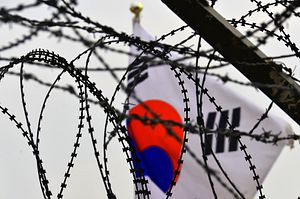The reliability of South Korea’s spy agency has come under renewed scrutiny after the reappearance of a North Korean army official who was previously reported killed.
In the latest in a series of embarrassing intelligence failures out of Seoul, former army chief of staff Ri Yong-gil* emerged alive Tuesday in state media coverage of the 7th Congress of the Workers’ Party of Korea.
Pyongyang’s Korean Central News Agency reported that Ri was appointed to several high-ranking party positions at the first such meeting since 1980. The Congress, which finished Monday, reaffirmed North Korea’s right to nuclear arms and announced a vaguely-defined five-year plan to improve the weak economy.
Following the KCNA report, Seoul’s Unification Ministry confirmed that Ri was in fact alive.
South Korean media reported in February that Ri was executed on the orders of Supreme Leader Kim Jong-un, continuing a trend of bloody purges associated with the young ruler. While media attributed the news to unnamed sources at the time, the left-leaning Kyunghyang Shinmun newspaper revealed on Thursday that the Unification Ministry, requesting anonymity, had planted the story while attributing the information to a “relevant agency.”
That agency is widely assumed to be the National Intelligence Service, although it has denied leaking information about Ri — maintaining a plausible deniability facilitated by South Korean journalists willing to conceal the agency’s hand in their reports.
The agency’s credibility has been stung by repeated intelligence failures in recent times, as well as political scandals that have brought it into disrepute, including an attempt to influence the 2012 presidential election.
In November, senior North Korean official Han Kwang-sang appeared on a list of members of a funeral preparation committee, six months after the NIS told lawmakers he had been killed.
The top intelligence body also appeared to have no advance knowledge of the timing of Pyongyang’s fourth nuclear test in January or the death of previous North Korean leader Kim Jong-il in 2011.
Ra Jong-yil, a former South Korean intelligence official, told The Diplomat that intelligence failures were actually routine, even among the best agencies around the world.
Nonetheless, he said the NIS had a particularly difficult task due to the nature of the North Korea regime.
“In the case of the NIS, it is particularly handicapped by the fact that its main target is a country which is the most secretive, hermetically sealed from the outside,” said Ra, who was deputy director of the North Korea bureau at the NIS.
“Another of its difficulties is that it is overexposed to the outside thanks partly to the process of opening up of the government. One could even entertain a suspicion in this case that Pyongyang did this deliberately with an eye to discrediting its main target in South Korea in public.”
* Name corrected.

































